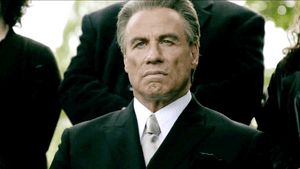Stay in the Loop
BSR publishes on a weekly schedule, with an email newsletter every Wednesday and Thursday morning. There’s no paywall, and subscribing is always free.
Disorganized crime
Kevin Connolly's 'Gotti'

Gotti, the recent biopic of 1980s New York mob boss John Gotti, fails in just about every way a motion picture can fail.
The film, directed by former Entourage actor Kevin Connolly, with a script by Lem Dobbs and Leo Rossi, fails at telling a coherent, compelling, or worthwhile story. It fails at making the case for its central thesis: John Gotti was the greatest and most awesome mob boss who ever lived. By filming in Cincinnati, Ohio, it even fails to get New York right.
It also failed at the box office, earning in the single-digit millions, and it failed with critics, earning a rare zero-percent Rotten Tomatoes score, based on 38 reviews. A wildly misleading social-media campaign argued that the same critics for whom the film hadn’t even been screened somehow conspired against it. But that failed too.
Perhaps worst of all, Gotti is a moral failure. By treating its murderous subject as an unambiguous hero, it does what gangster films have been falsely accused of doing for decades: glorifying mobsters. Gotti is what the stupidest fans of The Sopranos thought The Sopranos was.
But wait, there's more...
Gotti stars John Travolta as the mobster, and the way it tells his story is a model of gross incoherence. It jumps back and forth in time, utilizing multiple framing devices, including beyond-the-grave narration and a jailhouse conference between Gotti and his son, John Gotti Jr. (Spencer Lofranco.)
If the structure sounds bad, the dialogue is worse. It’s cliché after cliché, lifting lines straight from The Sopranos, other mob movies, and even Jim Valvano’s famous ESPYs speech about how cancer cannot touch his mind or heart.
The howlers are plentiful. At one point, Gotti’s sidekick (Stacy Keach) says he needs the support of the top gangsters in all five boroughs. He then — in discussion with this lifelong New York mob boss — lists the five boroughs. The film handles its mob business with a ridiculous amount of expository dialogue about characters we either never see or barely meet and tells more long, boring stories about mob feuds than any gangster movie ever should.
Even dedicated enthusiasts of 1980s New York mob history won’t find much to enjoy here. The pivotal relationship between Gotti and Sammy “The Bull” Gravano barely gets developed, while Donald John Volpenhein, as murdered rival Paul Castellano, has a nearly non-speaking role.

One role I wish was non-speaking is Gotti’s wife Victoria, played by Kelly Preston (who is married to Travolta), in a full-on shriek. Her performance is matched only by some of the worst wig work I’ve ever seen.
All in the family
No character is ever the right age. Twenty-five-year-old Lofranco plays Gotti Jr. from his teens to his 50s, always sporting the same contemporary haircut. Vincent “The Chin” Gigante, the gangster who famously faked dementia to avoid a prison sentence, is played by Sal Rendino, an actor who looks far younger than he should in this role.
Travolta did a campy over-the-top impression of Robert Shapiro to great effect in the miniseries The People v. O.J. Simpson, but that doesn’t work here. We’ve also seen him before as the coolest gangster in the room, most notably in Get Shorty. This is not that.
The film keeps telling us Gotti is the coolest, greatest gangster who ever lived, but all we see is a guy who keeps getting betrayed, is always on trial, and whose eventual incarceration and death helped snuff out the New York mob’s final period of dominance.
We see old footage of Gotti fanboys extolling their hero’s virtues, arguing that he was “doing it for his family” (a rationalization The Sopranos and Breaking Bad spent whole multi-episode arcs refuting). One ludicrously argues that Gotti “kept the streets safe” that and criminals took over once he went to prison in 1993. This is, as anyone familiar with New York crime history knows, the opposite of what happened.
Sympathy for the devil
At the end, the film takes a final pivot, arguing it was terrible and unfair that Gotti Jr. was sent to prison. (Preston shrieks, “The government are the real gangsters!”) Yes, the U.S. criminal justice system has very real inequities, but investigating and prosecuting the mafia isn’t one of them.
Some Americans hold an ingrained belief that the mafia are “the good criminals”: that they’re men of honor, respect, and class. This benefit of the doubt is rarely extended to criminals of other races or ethnicities, and it’s absolutely consistent with the film’s conspiratorial, Trump-like ad campaign. However, Gotti’s producers clearly hoped a lot more people felt that way. I saw the film in a nearly empty theater in its second week of release. That is also its last week in theaters.
The film was scheduled to open in December 2017 but was pulled days before, until it was picked up by the movie-subscription service MoviePass as part of its push into distribution. When someone inevitably writes a John Carreyrou/Theranos-type book about MoviePass’s fall, I can’t wait to read the chapter about Gotti.
What, When, Where
Gotti. Written by Lem Dobbs and Leo Rossi, Kevin Connolly directed. Philadelphia-area showtimes.
Sign up for our newsletter
All of the week's new articles, all in one place. Sign up for the free weekly BSR newsletters, and don't miss a conversation.

 Stephen Silver
Stephen Silver